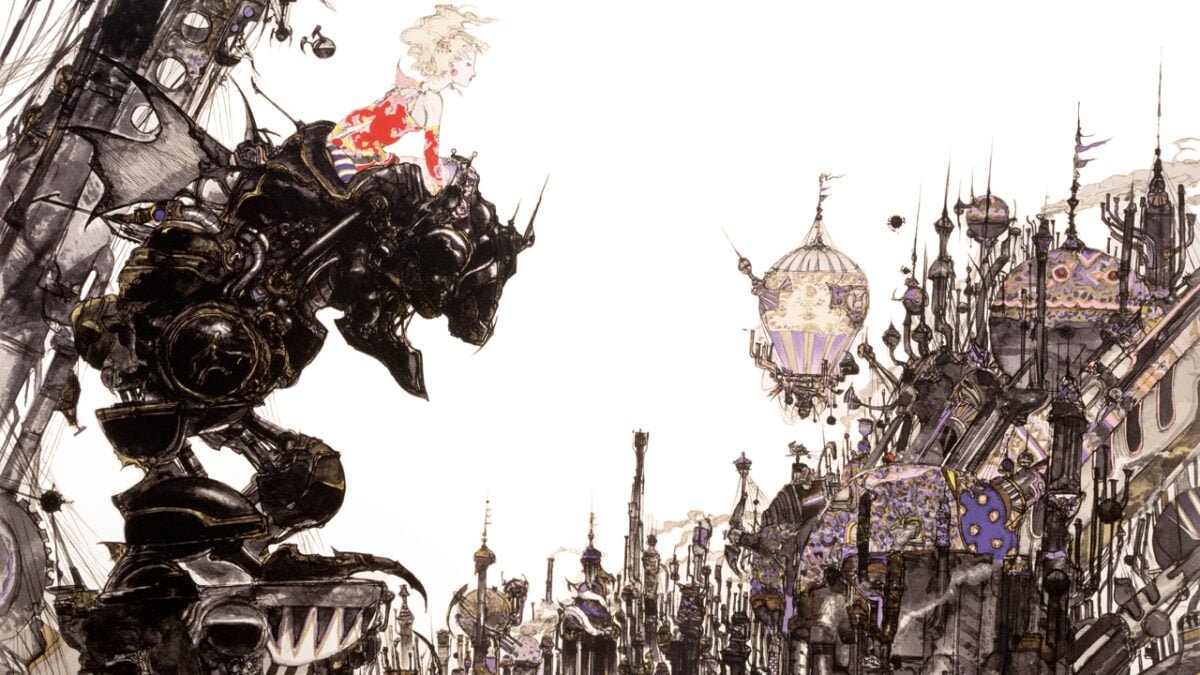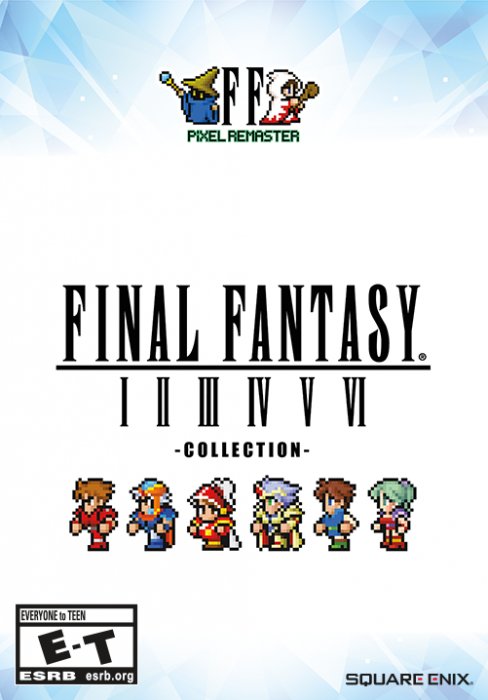The Final Fantasy Pixel Remaster Series brings the first six games in the pioneering series back to home consoles in one ultimate package.
In 1987, Square redefined RPGs in video game form with the Nintendo Famicom epic Final Fantasy, raising the bar for overall experiences in the genre. Five standalone sequels (and even some spin-offs) followed over the next seven years, each redefining the series’ trademarks in various ways. Combined, they laid the roadmap for RPGs made on both sides of the Pacific.

Afterward, Square switched camps for Sony to create one of the biggest games of all-time, and Final Fantasy went in bold new 3D directions as the company merged with its rival, Enix. The first six games have remained relevant through various crossover titles and re-releases, but just in time for the series’ 35th anniversary and the arrival of the next numbered title, newcomers have a fresh opportunity to see where it all began with the Final Fantasy Pixel Remaster Series.
This new release brings the recent Steam and mobile remasters to Nintendo Switch and PlayStation 4, either as a bundle or individual entries through the platform’s storefronts. (For starters, you can check out my reviews of the original releases for context on the individual games: I-II-III, IV, V, and VI.)
As on Steam, the Pixel Remasters are a faithful reimagining of Final Fantasy I through Final Fantasy VI—under guidance from original staff members like sprite artist Kazuko Shibuya and the legendary composer Nobuo Uematsu, Square Enix, the 8- and 16-bit classics have been given a presentational facelift that preserves the spirit of the original while updating it for modern displays. Instead of the mishandled look of the mobile and Steam ports we got around ten years ago, this latest remaster maintains the distinctive look that once blew minds in the early 90s and makes it fit 2023 displays.
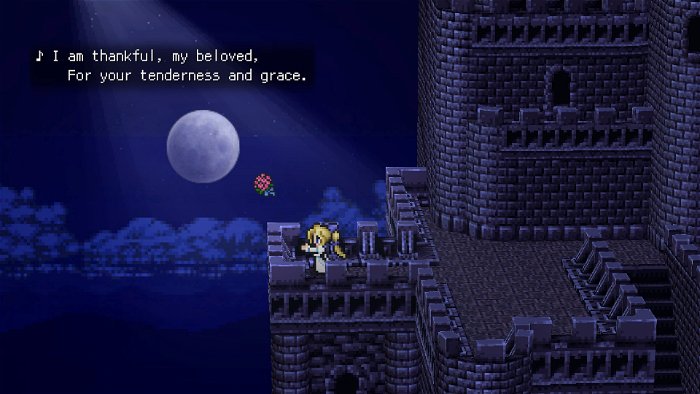
I hear some of you about to object and suggest “why not remake the games in HD-2D, the graphical style that Square Enix has been nailing lately?” And hey, I agree that would’ve been really cool. We even get a taste of it in Final Fantasy VI‘s beloved opera scene. Yet given the choice between preserving the original experience and rebuilding everything in the latest trendy style, I err on the side of preservation.
What I love about the Final Fantasy Pixel Remaster Series is that it presents these six classics in the perfect blend of old and new, for veterans and newcomers alike. Since discovering the original as a very young child, I’ve played almost every version of each game—braving fan translations of FFII and FFIII before their official English releases, hunching over my GBA SP and Dawn of Souls during high school spare periods—and each subsequent remake was starting to suffocate the original vision. I felt detached from the PSP and prior mobile/Steam ports because they were starting to look like fan recreations rendered in the latest RPG Maker.
The Pixel Remasters take Final Fantasy back to the pure experiences that inspired countless other creators and drove RPGs forward in every department. In the process they’ve abandoned the bonus content that has been appended, almost Katamari Damacy-style, across their history of re-releases—supplemental dungeons and rewards that either extend the stories or throw off the gameplay balancing. I do lament the loss of the extra content, but it was just that: extra. If that’s the cost of making the numbered Final Fantasy series almost entirely playable on modern platforms, I’ll take it.
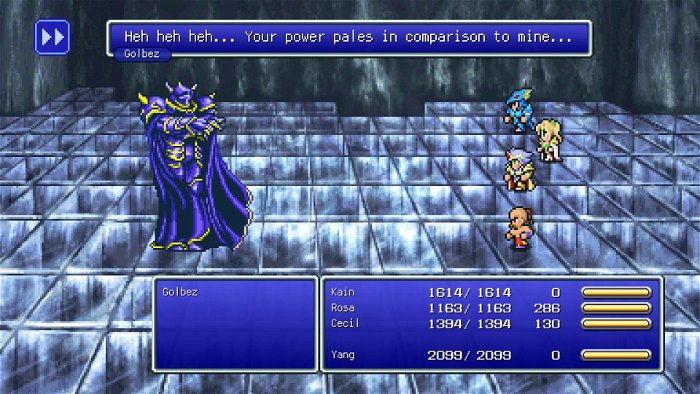
All of that was true of the Steam versions, but what about the console version in particular?
Well, I’m happy to report that the Final Fantasy Pixel Remaster Series feels right at home on the Nintendo Switch. The redefined graphics really shine in either handheld or docked mode (and in fact, the colours pop beautifully on the OLED). There’s something quietly fulfilling about having them all together under Nintendo’s original roof, albeit at the cost of the tastefully curated trophies available on other platforms.
For the console iteration, the Pixel Remasters incorporated an optional second font that melds better with the original style. While I still maintain the original font was perfectly fine, the new pixel-based text is certainly a better fit. Each game’s definitive scripts shine even brighter in this light.
This time around, the original soundtracks can be toggled either in-game, or in the main menu’s Music Player. As much as I adore Uematsu’s reimagined score, it’s also undeniably cool to switch over to the classics and admire what he achieved with incredibly modest means.
While quality of life updates made the Steam version more palatable for modern players who may not appreciate the old grindy ways, Final Fantasy Pixel Remaster Series goes a step further on console. Players can utilize a menu’s worth of boosts to tailor the experience to their liking, increasing the spoils of battle like EXP, gil, and other game-specific options.
Normally I advise against these things, but they really go a long way with Final Fantasy II in particular. The original sequel is the black sheep of the family thanks to its unique character development system. With the new boost menu, however, its “learning by doing” system can be accelerated to more palatable levels.
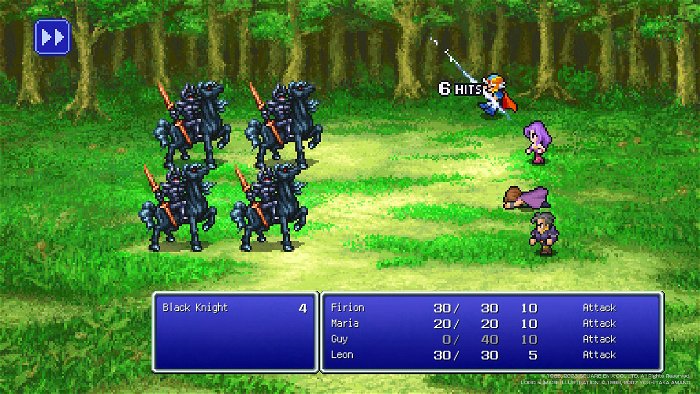
This marks the first time in over twenty years that these six games have been re-released on home consoles (aside from the emulated PlayStation Classic re-releases, or Nintendo’s NES/SNES Classic machines); Final Fantasy III, in its original 2D form, has never been playable in English on home consoles. On its own, that’s a minor cause to sit up and take notice.
But as a complete package, I can’t find much not to like about the Final Fantasy Pixel Remaster Series. It’s an incredible bundle of video game history, which any fan of turn-based RPGs should play if they haven’t already (and maybe again, if they already have).
Only a few small flies got caught in the ointment and held the Pixel Remaster collection back from a perfect score. The complete absence of that extra content from previous versions is the biggest thing that keeps the age-old “which version is best” debate alive; if it was present as, say, optional DLC, this could have been the nigh-indisputable champion of Final Fantasy retro collections.
Likewise, an argument can be made for the inclusion of character portraits in dialog, to help highlight the speaker as previous ports did. I get why they were left out, as they aren’t universally applicable across all six games, with their varying degrees of exposition and protagonist involvement, but sometimes it would be nice to have a touch more Amano art on the screen.
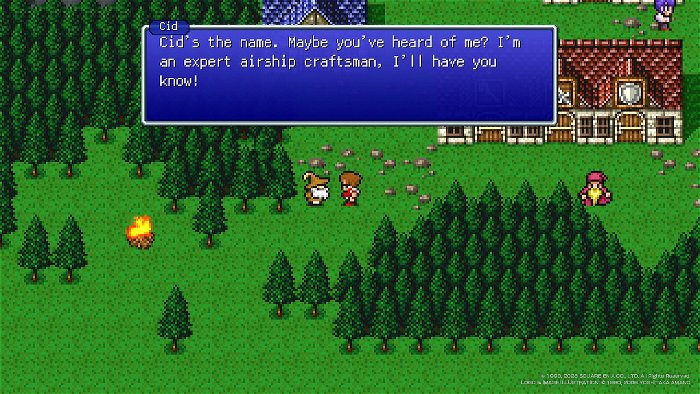
It’s also a damn shame that the collection is not getting a proper, widespread physical release. At publication time we’ve been unable to confirm the future availability of the limited physical editions—which were quietly listed while most of North America was asleep and sold out immediately. The Pixel Remasters deserve a shot at reaching wider audiences from the shelves of their local game stores, if nothing else.
Nonetheless, I was already singing the praises of the Final Fantasy Pixel Remaster Series since its Steam launch, so it’s a dream come true to have the classics back on consoles, loving recreated with the kinks worked out. Few remasters have been able to strike such a careful balance between modern quality of life updates and faithfulness to the source material.
I could go on about which of the six games to play and why, but if nothing else, consider checking out Final Fantasy III or Final Fantasy V if you haven’t before. Both utilize the classic Job class system to great effect, offer a cross-section of their respective eras, and are underappreciated after being withheld from western audiences in their own time.
